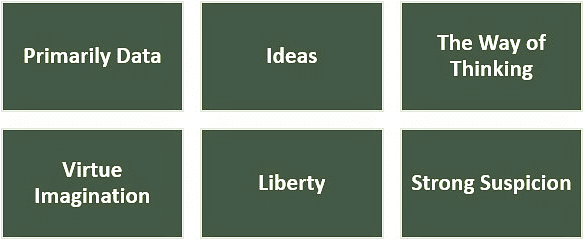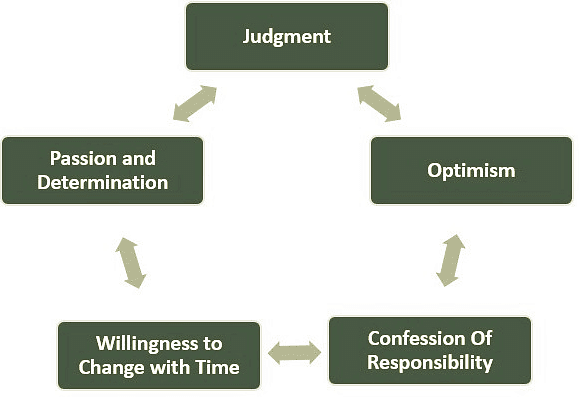Personality Development and Value Education | Psychology for UPSC Optional (Notes) PDF Download
| Table of contents |

|
| Introduction |

|
| Understanding Value Education and Personality Development |

|
| Learning Values: The Impact of Education |

|
| Importance and Range of Values-Based Education |

|
| Measurement of Virtues |

|
Introduction
In today's dynamic and diverse society, individual differences in emotional, cognitive, and behavioral reactions shape our personalities. Our personality is what makes us unique, encompassing all our responses and interactions with others. Therefore, it is essential to foster the development of sound judgment and moral principles through value education and personality development. These aspects are crucial in the educational process and contribute to one's character, personality, and spiritual growth.
Understanding Value Education and Personality Development
Value-based education aims to provide students with a moral compass that guides their actions and decisions in the real world. It focuses on holistic growth, encompassing a person's character, personality, citizenship, and spirituality. To truly understand someone's character, we must look at them as a whole, considering a wide variety of experiences that influence their personality development. These experiences include lessons from parents, the community, and life itself.
Several factors contribute to shaping an individual's character:
- Genetic: Prenatal traits, which are genetically inherited, play a role in defining qualities such as appearance, sex, personality, stamina, circadian cycles, muscle composition, and reflexes.
- Environmental: Our upbringing significantly influences us. Our culture, family, friends, communities, and learning experiences all contribute to shaping our character.
- Conditions: The living circumstances we find ourselves in also shape our behavior and character.
Learning Values: The Impact of Education
Education plays a pivotal role in shaping an individual's character. It is not merely about acquiring knowledge but also about developing crucial skills. The following six skills are essential in a good education:
- Data: Education should not be limited to information alone. Distinguishing between information and education is vital.
- Ideas: Academic inquiry begins with formulating a hypothesis based on underlying concepts. The process of creating something from nothing starts with conception.

- The Way of Thinking: Developing a positive outlook is a crucial goal of education. Our attitude at the right time and place determines our actions and behaviors.
- Virtue Imagination: Creativity and the arts require a vivid imagination, but excessive immersion in one's thoughts can lead to psychosis. Finding the right balance is key.
- The Principle of Liberty: Independence is essential to our essence. Freedom is the catalyst for happiness, kindness, and other admirable human traits. Without it, thoughts become suffocating, ideas lose meaning, facts become meaningless, and creativity fades.
- A Strong Suspicion: Intuition is the essence of freedom. Without independence, we lack intuition. Rapid and enjoyable learning depend on intuition, making it an invaluable skill.
By incorporating values and life skills into both formal and informal education settings, schools can produce graduates with a strong moral compass.
Importance and Range of Values-Based Education
- Values education refers to the instilling and familiarity with the values held in high esteem by a particular culture. It serves as a guiding light, showing individuals the path forward and enlightening them about their true calling. Students benefit greatly from value education as it helps them think critically and practically, leading to a deeper understanding of the world and enabling them to become productive citizens. It also facilitates stronger connections with loved ones and brings about positive changes in students' identities and dispositions.
- The goal of value education is to transform students into optimistic individuals who are aware of principles and demonstrate them in their daily actions and outlook. This transformation enables them to positively impact their communities as reliable and trustworthy citizens. Values encompass virtues such as love, affection, friendship, noble groups, reference groups, hospitality, bravery, service, justice, freedom, forgiveness, patience, coordination, compassion, and tolerance. Moral and ethical concepts, including respecting authority, fulfilling promises, avoiding unnecessary confrontation, avoiding dishonesty and cheating, and supporting hard work, are also crucial components.
- Integrity is an essential aspect of righteousness, which has a spiritual dimension. Spiritual traits include purity, meditation, yoga, clarity, control, and devotion to God. Spirituality emphasizes self-control, self-discipline, happiness, temperance, and a detachment from worldly pursuits. Universal values transcend cultural boundaries and enable effective communication and collaboration between individuals and societies. Culture shapes morality, ethics, and social norms, with language, ethics, social hierarchy, aesthetics, education, law, economics, philosophy, and other social institutions reflecting a culture's values.
Measurement of Virtues
The measurement of virtues is an important aspect of understanding the impact of value education on students. Several key measurements include:
- Judgment: Assessing whether a student's personality flourishes when exposed to a curriculum that emphasizes human values.

- Optimism: Understanding the value of optimism, which is indicative of an upbeat character. Positive outlooks have the power to transform individuals.
- Confession of Responsibility: Observing whether students become more accountable and willing to accept responsibility through the study and application of human values. This contributes to personal development and societal advancement.
- Willingness to Change: Determining whether students who engage in human values are more open to embracing new tasks and adapting to changing times. This trait helps them navigate the perils and opportunities that life presents.
- Passion and Determination: Recognizing that motivation and ambition significantly shape a person's personality and development. Engaging in acts of service can foster good character traits, such as empathy and compassion.
Conclusion
Human values are not only a theoretical judgment but also serve as a universal language for communication and cooperation within educational institutions. They provide direction and purpose to one's life, enriching one's education and maintaining a calm and creative state of mind. Living in alignment with our values is a worthwhile pursuit, benefiting both individuals and society as a whole.
|
160 videos|215 docs
|














